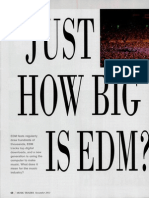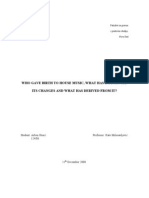Roughdraft
Roughdraft
Uploaded by
api-315846751Copyright:
Available Formats
Roughdraft
Roughdraft
Uploaded by
api-315846751Original Title
Copyright
Available Formats
Share this document
Did you find this document useful?
Is this content inappropriate?
Copyright:
Available Formats
Roughdraft
Roughdraft
Uploaded by
api-315846751Copyright:
Available Formats
Carver 1
EDM is a booming business
EDM is a cultural and financial revolution, finding success in the mainstream to
become the music of the milinemium. Not only has EDM come from the underground scene
played in near secrecy, all the way to the top, it is also a financial powerhouse in the modern
economy. From its roots of disco and early age techno, EDM, or Electronic Dance Music, has
been a term used to encompass the near entirety of the electronically made makes you want to
dance music.
The history of EDM as it is known today can be traced back to its club roots of disco.
Disco, a word derived from the French word discothque, meaning a place for discs. Those
discs were vinyl records (Glazer). Disco at the time was used to describe the place the music
was taking place rather than the style itself,and in most cases it was a mostly underground scene
as France was a german occupied nation at the time (Glazer). From the beginning, electronic
music has its roots embedded in the underground scene. Moving forward in time, disco became a
term to describe the music rather than the scene. By the early 1970s in New York, disco as a
genre name began to take hold at underground parties like The Loft and The Gallery, used to
describe the new sound which blended elements of funk and soul (along with Latin rhythms) to
create a steady dance floor beat that could go on all night (Glazer). This was the beginning of
genre distinctions that would go on the become a pivotal part of EDM culture.Vinyl records were
the beginnings of EDM, disco never quite rose to the musical superpower its ancestor would be,
but it paved the way for the distinct genre subcategories that exist in EDM today. All the
differing categories of EDM exist for a distinct reason, Its a result of the performance model,
where DJs play mostly songs created by other producers, rather than their own compositions.
Furthermore, the music is meant to be seamlessly mixed together, creating a single musical
Carver 2
experience greater than the sum of its parts (Glazer). DJs are meant to keep a centralized
theme to the mix, making sure the transitions between compositions is seamless and not too
harsh, DJs must also keep the central theme so as not to create a mixture of conflicting styles.
This paved the way for other genres of music to begin emerging, one such genre was House,
made popular in clubs in the 80s. House music was named after the WareHouse, a nightclub
where resident DJ Frankie Knuckles would play a mix of traditional disco and the more primitive
sounding dance records being created by local musicians using a new generation of cheaply
priced electronic instruments, including synthesizers, drum machines and early samplers
(Glazer). If disco was the dance in EDM, then house is the electronic. House music was
around the first genre to begin using electronic synthesizers and samplers to create a unique style
and clubby vibe that people began to fall in love with. From the 80s to the mid 2000s came
all new styles and a rising problem, there began to be no way to keep up with all of the differing
styles of electronic music at the time. Thus the term EDM was born, EDM in itself is an umbrella
term meaning to encompass a wide variety of music into one category. This has created some
problems in the electronic music community as many believe it to be a term too general to use as
it doesnt distinguish clearly between subgenres. It is the use of EDM as a catchall term is far
more problematic, refusing to distinguish between the sing-along songs of Avicii, the taunt
techno of Carl Cox, and the destructive dubstep of Skrillex (Glazer). The need for such a broad
term arises from the large scale festivals that take place the need to attract as many people as
possible, and these large scale events do just that with the sales figures to prove it.
EDM festivals are among the biggest economically profitable festivals of all time
bringing in millions and sometimes billions every year. EDM is so profitable it allowed the top
10 highest paid DJs of 2011 to bring in a combined 115 million dollars (Godard), and those
Carver 3
numbers have only grown. Coachella, one of the premier music festivals in North America, in
2012 and 2013 brought in 47 millions dollars in revenue (Godard). Another of North Americas
flagship festivals is EDC, or Electric Daisy Carnival, brought in a little over 200 million dollars
for the Las Vegas community over a weekend alone. Beacon, a company hired by the event
heads to measure the impact of their festivals on cities, calculated that 108,000 of the festivals
115,000 people came from different parts of the world and spent millions eating, drinking and
staying in the surrounding areas (Godard). This popularity in EDM has allowed for individual
DJs to rise to the mainstream and thus get paid accordingly. Calvin Harris was the top paid DJ
of 2015 earning 66 million alone (OMalley). With DJs like Calvin Harris, David Guetta and
Tisto leading the pack, electronic music's popularity has ballooned in the past decade. From
festivals to radio airplay, social media and even collaborating with A-list musicians, EDM artists
are getting a lot of attention, and money,from all over the place (Alvarado). This rising
popularity is attributed to the mainstream media, hearing things played on the radio instead of
having to go and search for them. Of course EDM was not likely to become as popular if it
didnt bring in the amount of money it does, A report stated that EDM is a $6.2 billion global
industry. Most of the money comes from festivals, Las Vegas club dates and other global club
gigs (Alvarado). These are a lot of numbers but what do they really mean? These numbers show
EDMs true popularity with the masses. People want more and new, so how far can EDM go
before it is forced the way of the dodo? Many believe EDM to be an art that has lost its purity,
and are unsure of just how far it may go, ...is it going to end?' I always say I don't know. It
keeps evolving, every year something new comes up, and now it's at the highest it ever has been,
so now I don't know how much higher and how much better it'll get," says Tisto.
Carver 4
Peter Brownlee is a producer, mix engineer and musician at Echo Mountain Studios in
Asheville, NC. Peter began playing cello in the third grade and began recording in seventh grade.
Peter has been working at Echo Mountain for almost a year now and has his own home studio in
West Asheville. Peter graduated from Berklee College of Music in Boston, Massachusetts and
found himself producing and mixing music straight out of college. Peters music and aid in
music can be found on his website. Peter found himself more knowledgeable in college in the
engineering side of music production, but enjoys performing above all else. I believe that
certain genres of music can never truly die out, I think that music as an entirety is something that
we as a human race will always find new ways to revive a music we thought was gone. Take
electro for example, rose and kind of died off in the 80s but we made a comeback in one way or
another to electro. So the answer to that question [Is EDM going to fade away?] isnt as simple
as one might hope, its a yes and a no from me. I believe the EDM that we know and love today,
this mainstream bringing in the pop stars and such will fade, but the true roots, the true feeling of
EDM can never truly die. The fan base is too loyal for such an event to happen, I feel like even if
we stop bringing in big names, people will still love it for years to come (Brownlee).
EDM, like it or not, is the defining music of this generation and has rightfully earned that
title. From its roots and suppression in France, all the way down to the multi-billion dollar
industry that it is today, EDM has risen above the odds to become the new powerhouse in music.
The love and devotion to the music hasnt died over the years and has even increased
exponentially. EDM is this generations Rock and Roll defining new times and bringing in
a substantial amount of money along with it.
Carver 5
Works Cited
Alvarado, Abel. "It's a $6.2B Industry But, How Did EDM Get so Popular? - CNN.com."
CNN. CNN, 30 Oct. 2015. Web. 16 Feb. 2016.
Glazer, Joshua. "Etymology of EDM: The Complex Heritage Of Electronic Dance Music
- The Economics of Electronic Dance Music Festivals." Medium. Medium, 10 Oct. 2014.
Web. 16 Feb. 2016.
Godard, Thierry. "The Economics of Electronic Dance Music Festivals." SmartAsset.
SmartAsset, 12 Aug. 2015. Web. 16 Feb. 2016.
Carver 6
Brownlee, Peter. "Etymology of EDM." Personal interview. 25 Feb. 2016.
O'Malley, Zack. "The World's Highest-Paid DJs: Electronic Cash Kings 2015." Forbes.
Forbes Magazine, 24 Aug. 2015. Web. 28 Feb. 2016.
You might also like
- RSL Grade 8 PDFDocument92 pagesRSL Grade 8 PDFЭдуард Андреев100% (5)
- Blues ScalesDocument6 pagesBlues ScalesJJ Magallon100% (1)
- Electronic Dance MusicDocument7 pagesElectronic Dance MusicJohn DaeNo ratings yet
- Disco Dance (The American Dance Floor) by Lori Ortiz PDFDocument188 pagesDisco Dance (The American Dance Floor) by Lori Ortiz PDFFlávio Lima100% (1)
- A Brief History of EDMDocument2 pagesA Brief History of EDMFendy ShirahNo ratings yet
- Aaron Darling Davey Mills English Honors IV 10 September 2016 The "Superior" MusicianDocument20 pagesAaron Darling Davey Mills English Honors IV 10 September 2016 The "Superior" Musicianapi-339136692No ratings yet
- Edm Rave CultureDocument10 pagesEdm Rave CultureRayNo ratings yet
- The Economics of Electronic Dance Music FestivalsDocument3 pagesThe Economics of Electronic Dance Music FestivalsTasneemNo ratings yet
- Electronic Dance Music: From The Underground To The Pop SoundDocument13 pagesElectronic Dance Music: From The Underground To The Pop Soundiamgod93081No ratings yet
- City Evaluation Chris Pickett August 4, 2010 ENGL 320 Unit 3 ProjectDocument6 pagesCity Evaluation Chris Pickett August 4, 2010 ENGL 320 Unit 3 ProjectChris PickettNo ratings yet
- The Rise of EDM and Its Influence On Youth CultureDocument3 pagesThe Rise of EDM and Its Influence On Youth Culturecoxam85845No ratings yet
- Just How Big Is EDM by StaffDocument6 pagesJust How Big Is EDM by StaffFlorin CiocanuNo ratings yet
- Origins: Techno Is A Form ofDocument2 pagesOrigins: Techno Is A Form ofanonymous 2509No ratings yet
- Black Gaviola - Project 3 FinalDocument9 pagesBlack Gaviola - Project 3 Finalapi-376282285No ratings yet
- Music Scene Evaluation - ReviewedDocument5 pagesMusic Scene Evaluation - ReviewedChris PickettNo ratings yet
- Digital Revolution: The Free Flow of MusicDocument6 pagesDigital Revolution: The Free Flow of MusicandreilegolasNo ratings yet
- Music Scene Evaluation Chris Pickett August 4, 2010 ENGL 320 Unit 3 ProjectDocument5 pagesMusic Scene Evaluation Chris Pickett August 4, 2010 ENGL 320 Unit 3 ProjectChris PickettNo ratings yet
- Enter HouseDocument3 pagesEnter Houselaurbaby32No ratings yet
- 2020 International Cultural Exchange Conference and 2020 International Environment Protection Awareness ConferenceFrom Everand2020 International Cultural Exchange Conference and 2020 International Environment Protection Awareness ConferenceNo ratings yet
- Electronica: 2 A Wave of Diverse ActsDocument5 pagesElectronica: 2 A Wave of Diverse ActsJohn DaeNo ratings yet
- History CAODocument6 pagesHistory CAOmully258No ratings yet
- The True Story of Acid House: Britain’s Last Youth Culture RevolutionFrom EverandThe True Story of Acid House: Britain’s Last Youth Culture RevolutionRating: 4 out of 5 stars4/5 (1)
- EDM Pop A Soft Shell Formation in A NewDocument21 pagesEDM Pop A Soft Shell Formation in A NewZulfiana SetyaningsihNo ratings yet
- Hamhuis, Sonja - Bachelor EindwerkstukDocument38 pagesHamhuis, Sonja - Bachelor EindwerkstukAlexandros RouchitsasNo ratings yet
- Beyond the Dance Floor: Female DJs, Technology and Electronic Dance Music CultureFrom EverandBeyond the Dance Floor: Female DJs, Technology and Electronic Dance Music CultureNo ratings yet
- Music Titans: 250 Greatest Recording Artists of the Past 100 YearsFrom EverandMusic Titans: 250 Greatest Recording Artists of the Past 100 YearsRating: 5 out of 5 stars5/5 (1)
- Finals Spe-MusicDocument30 pagesFinals Spe-MusicMerlyn NavarroNo ratings yet
- Jonathan Hamilton Topic ProposalDocument5 pagesJonathan Hamilton Topic ProposaljonatheryNo ratings yet
- The Underground Is Massive: How Electronic Dance Music Conquered AmericaFrom EverandThe Underground Is Massive: How Electronic Dance Music Conquered AmericaNo ratings yet
- Atestat Morarescu Andrei - Techno MusicDocument40 pagesAtestat Morarescu Andrei - Techno MusicAndrei MorarescuNo ratings yet
- Dance MusicDocument5 pagesDance MusicScribdTranslationsNo ratings yet
- Rave SubcultureDocument6 pagesRave SubcultureFeross HawatmehNo ratings yet
- PaperDocument40 pagesPaperCharles Wesley YapNo ratings yet
- Final ReviseedDocument10 pagesFinal Reviseeddaking88kingNo ratings yet
- Any Night of the Week: A D.I.Y. History of Toronto Music, 1957-2001From EverandAny Night of the Week: A D.I.Y. History of Toronto Music, 1957-2001Rating: 3.5 out of 5 stars3.5/5 (1)
- Final Reviseed With The Changes MadeDocument9 pagesFinal Reviseed With The Changes Madedaking88kingNo ratings yet
- The Greatest Band That Ever Wasn't: The Story Of The Roughest, Toughest, Most Hell-Raising Band To Ever Come Out Of The Pacific Northwest, The Screaming TreesFrom EverandThe Greatest Band That Ever Wasn't: The Story Of The Roughest, Toughest, Most Hell-Raising Band To Ever Come Out Of The Pacific Northwest, The Screaming TreesNo ratings yet
- Superfans: Power, Technology, and Money in the Music IndustryFrom EverandSuperfans: Power, Technology, and Money in the Music IndustryNo ratings yet
- House Music EssayDocument10 pagesHouse Music EssaySanja AjdukovićNo ratings yet
- Country Music Thesis StatementDocument8 pagesCountry Music Thesis Statementlauramillerscottsdale100% (2)
- The Emergence of The Rural American Ideal in JazzDocument32 pagesThe Emergence of The Rural American Ideal in Jazzr-c-a-d100% (1)
- Techno! Techno! Techno! Techno!Document21 pagesTechno! Techno! Techno! Techno!rialtoflatNo ratings yet
- Produced and Edited by Keri Bentley: Everything You Need To Know About Music Festivals!Document12 pagesProduced and Edited by Keri Bentley: Everything You Need To Know About Music Festivals!api-285486584No ratings yet
- Edm EconomicsDocument24 pagesEdm EconomicsIrwin ZappattaNo ratings yet
- MUSC215 Midterm Study GuideDocument12 pagesMUSC215 Midterm Study GuideBrian WangNo ratings yet
- New BlogDocument5 pagesNew BlogMukesh SharmaNo ratings yet
- Turnitin For The Research Essay - Brooke AdkinsDocument10 pagesTurnitin For The Research Essay - Brooke Adkinsapi-549228020No ratings yet
- It's a London thing: How rare groove, acid house and jungle remapped the cityFrom EverandIt's a London thing: How rare groove, acid house and jungle remapped the cityNo ratings yet
- Influence of Rap On The YouthDocument11 pagesInfluence of Rap On The YouthAARYAN RAJ PRADHAN 2233102No ratings yet
- When Disco Was Everything: Pop Gallery eBooks, #10From EverandWhen Disco Was Everything: Pop Gallery eBooks, #10Rating: 1 out of 5 stars1/5 (1)
- Music in The Digital Age Musicians and Fans Around The World Come Together On The NetDocument24 pagesMusic in The Digital Age Musicians and Fans Around The World Come Together On The NetRodrigo MartinotNo ratings yet
- Soundstorm: Musings on the Madness of the Modern Music EcosystemFrom EverandSoundstorm: Musings on the Madness of the Modern Music EcosystemNo ratings yet
- Sociology in MusicDocument7 pagesSociology in Musicmbarten89No ratings yet
- Music Presentation: Sylva Emilyan, Fall 2008Document24 pagesMusic Presentation: Sylva Emilyan, Fall 2008Frans VernandoNo ratings yet
- Argumentative EssayDocument4 pagesArgumentative Essayapi-576051269No ratings yet
- Guide To Club DanceDocument33 pagesGuide To Club DanceAmir Sanjary ComposerNo ratings yet
- Holy Forever-chords-BbDocument1 pageHoly Forever-chords-BbNorson FernandezNo ratings yet
- Jordu Max Roach Solo PDFDocument2 pagesJordu Max Roach Solo PDFAndrás Berta100% (1)
- Enrique Iglesias, Descemer Bueno, Anselmo Ralph, Zé Felipe - Súbeme La Radio (Portuguese Remix) Music Video, Song Lyrics and KDocument1 pageEnrique Iglesias, Descemer Bueno, Anselmo Ralph, Zé Felipe - Súbeme La Radio (Portuguese Remix) Music Video, Song Lyrics and KprryoussefNo ratings yet
- TimDocument3 pagesTimBea DiloyNo ratings yet
- RevistaDocument7 pagesRevistacristaveiraNo ratings yet
- Presentation (5) 075424Document20 pagesPresentation (5) 075424Trisha PachecoNo ratings yet
- Playing Standards and Classic CompositionsDocument5 pagesPlaying Standards and Classic CompositionsMuhammad HafizNo ratings yet
- AABA Score PartsDocument7 pagesAABA Score Partsa478458188No ratings yet
- Distant SunDocument1 pageDistant SuntobiasbuschNo ratings yet
- Roundabout - Full ScoreDocument12 pagesRoundabout - Full ScoreChristophNo ratings yet
- "YELLOW" Ukulele Tabs by Coldplay on UkuTabsDocument3 pages"YELLOW" Ukulele Tabs by Coldplay on UkuTabsprflpvpNo ratings yet
- Fingerpicking Lounge SongbookDocument24 pagesFingerpicking Lounge SongbookMichel André Montégu CanessaNo ratings yet
- Art FarmerDocument6 pagesArt FarmerManzini MbongeniNo ratings yet
- Trap Music PDFDocument5 pagesTrap Music PDF何昂阳No ratings yet
- YYZ Bass DrumsDocument13 pagesYYZ Bass DrumsAdalbertoOrnelasNo ratings yet
- Roblox ID Codes 2024 (Drymze)Document7 pagesRoblox ID Codes 2024 (Drymze)aliucar200234No ratings yet
- Roman Empire POD TABDocument6 pagesRoman Empire POD TABDanielNo ratings yet
- Country ChartsDocument4 pagesCountry ChartsAnthony WarwoodNo ratings yet
- Rave SubcultureDocument6 pagesRave SubcultureFeross HawatmehNo ratings yet
- Hallelujah I Just Love Him SoDocument6 pagesHallelujah I Just Love Him SoSol GamsuNo ratings yet
- TemasDocument3 pagesTemasDiana Liuba Gonzalez VidalNo ratings yet
- 100 JazzDocument8 pages100 JazzRodrigo Reinaldo100% (1)
- Tarea de InglesDocument13 pagesTarea de InglesAGUSTÍN GUAJARDO SOTONo ratings yet
- Bob Marley's BiographyDocument4 pagesBob Marley's BiographyJuan Jose BedoyaNo ratings yet
- The Sorcerer S Apprentice - Sax Quartet Tenor SaxophoneDocument2 pagesThe Sorcerer S Apprentice - Sax Quartet Tenor SaxophoneJason MitchellNo ratings yet
- Watermelon Man Lesson (Fretdojo) PDFDocument15 pagesWatermelon Man Lesson (Fretdojo) PDFsantiago50% (2)
- Catalog 2014 PDFDocument38 pagesCatalog 2014 PDFsharklasers.com100% (1)
























































































